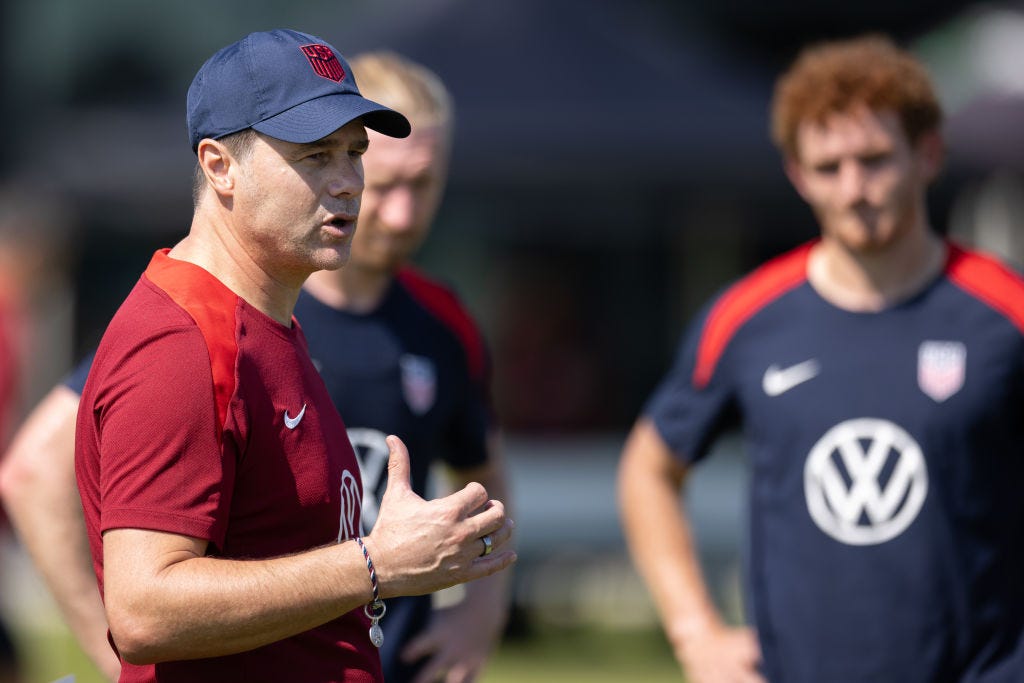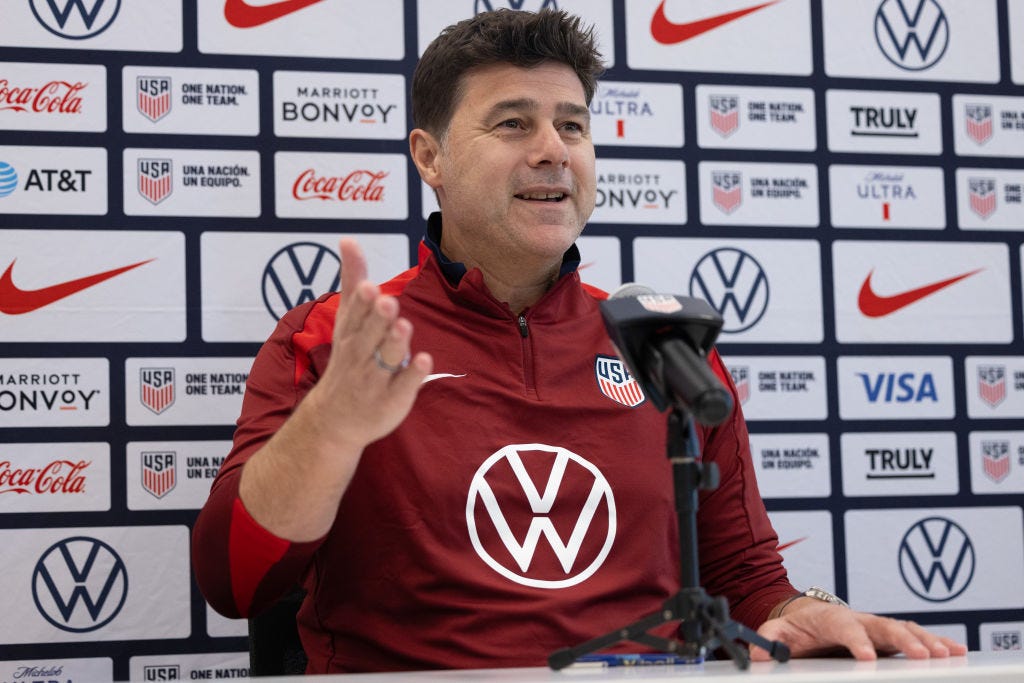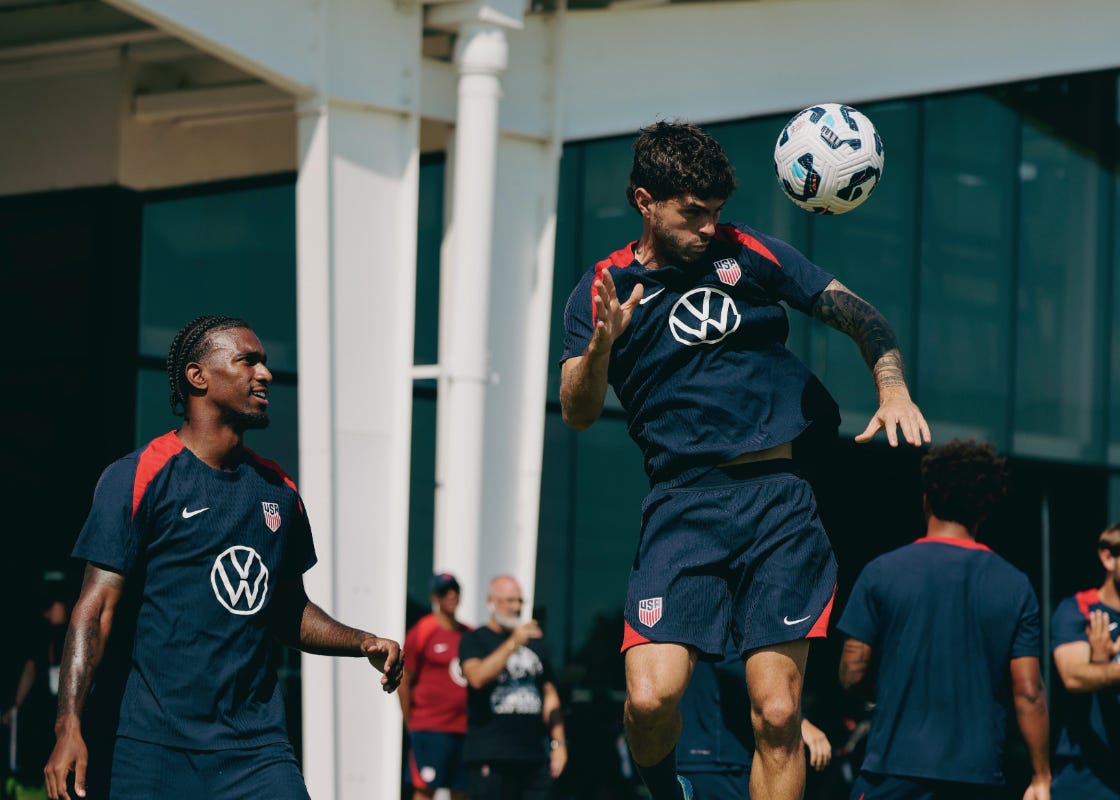🇺🇸 Ahead of USMNT debut, Pochettino building relationships & finding balance between club and country
After years managing clubs, the Argentine will need to make modifications to find success in the international game.
Reporting from Austin
There was some surprise when new U.S. national team manager Mauricio Pochettino said earlier this month he’d spoken with just one player on the team he is taking over, and that was by chance.
In his first week actually working with the team, though, he’s making up for any lost time. Ahead of tonight’s match with Panama at Q2 Stadium and next week’s trip to meet Mexico in Guadalajara, Pochettino is prioritizing the human element.
“Our first camp is about knowing each other and them knowing us, not only players but the whole staff, the people working together and having the capacity to organize and set up the way we want to work is the most important thing from the beginning,” the manager said Friday.

Pochettino is still working through coveted one-on-one meetings with players. He might be going down the depth chart.
Star attacker Christian Pulisic said they’ve had several conversations, while midfielder Yunus Musah said, “He’s a person that’s close to the team and likes to interact with us and tries to know us personally.” But is still yet to have a one-on-one.
What’s clear is that as Pochettino transitions from managing clubs - most recently Chelsea, but before that PSG, Tottenham Hotspur, Southampton and Espanyol - to managing the U.S., he wants to build relationships.
“First of all, I think he cares about mostly … me, the individual players,” Pulisic said. “He understands we want to win these games, but also how’s the body feeling, what’s the right amount of training? I think he’s looking forward to even bigger things as well, which is important. He’s been very friendly and helpful for all the players.”
And not just the players. The former defender mentioned multiple times that he wants to get along well with staff members he’s inherited and also noted that even the previous coaching staff left plenty to build upon.
“I think we have to respect the processes. We don’t want to be different, either. We want to put our stamp on the team,” Pochettino said in Spanish. “I think the United States national team had a great period with Gregg Berhalter, very successful and you have to recognize everything he’s done. Unfortunately, in soccer - it’s happened to us to, you’re in a project, it ends, other people come in.
“What we want is for right now to help the players, the staff, the federation to be able to achieve goals.”
A statement like that is a reminder that Pochettino is trying to smoothly go from a club coach to someone who recognizes he is dealing not only with a team and a local fan base but with a whole country.
His counterpart Saturday, Panama manager Thomas Christiansen, went through the same transition. After coaching clubs in Cyprus, England and Belgium, Christiansen debuted as Panama coach four years ago this month.
“You don’t have the chance to work day-to-day with your players. You’ve got just a few days when the FIFA dates start,” said Christiansen, who knows Pochettino after being in the same coaching classes with him when working on their badges. “It’s tough to work with them. He’ll have to get used to that.
“If not, you have to follow them, have contact with players, see how they are, be on top of them in another way. That’ll be the biggest difference going from being in a club to a national team.”

Pochettino has been with his players less than a week and hasn’t even led a game yet, but already he seems to be dreading the day they head back to their clubs and he and his staff are reduced to watching, planning and, ideally, having conversations on purpose rather than because of the choice of a restaurant.
It is healthy to miss players and to enjoy being around each other. That is an adaptation that should come easily to Pochettino. More difficult is making sure the things he and his staff are asking for from his players in this camp get produced again next month without them needing to ask.
Yet, for someone known for a defined style of play, Pochettino made it clear he’s ready to sacrifice rigidness for results when it comes to the way the U.S. builds its identity.
“People sometimes say, ‘That’s my philosophy, my idea and I’m going to die with my idea.’ No, I want to live because life is amazing. I want to be clever. I want to win,” he said. “I don’t want to die. Sometimes we can’t play. We need to find a different way to put our player in a comfortable zone. We are a team that has a massive challenge ahead, and all those concepts and ideas to translate is to find the best way to compete.
“Teams that win - Madrid, Argentina, even Manchester City, they want to win. They’re pragmatic.”
Beyond that, he said, those teams adapt to the opponent, to the circumstance in the game, and to the moment over the long haul. If a center back puts a boot into a ball looking for a route one goal against a team that has briefly come out of its shell, that might be a moment the staff applauds, even if it isn’t in Pochettino’s blueprint for success.
Neither is his idea to try to hammer a square peg in a round hole, and this week has helped him understand which players are happy doing what.
Often at the international level, a manager must adapt to the player pool he has rather than try to adapt the team to his ideas about soccer. There’s no going out to buy a new left-footed center back or a modern center forward. What the U.S. has is - by and large - what it has.
“You need to provide the tools and put them in place. If a player doesn’t have the conditions to do something, why would you force him to do things that will not be in a comfortable zone?” Pochettino said. “That’s why (every time we have the players) it’s about creating the dynamic, the possibility. To meet them is to build the team with adaptation to our philosophy.
“I think it’s to trust more in them. Sometimes we don’t appreciate or underestimate them, but they are very well educated and have the knowledge and can apply every way we propose to play.”
Perhaps this is where that happy medium lies, where that “American style of play” can be teased out by an old-school Argentine.
Fans long have wondered if the U.S. is better off leaning on what made it special in tournaments like the 2002 World Cup, when a cocktail of two parts grit, one part athleticism and one part technical ability produced an historic run to the quarterfinals. Or should the play on the field be more refined, with Americans just as able to play in ‘the modern game’ than any other national team?
Pochettino will work to find that balance to produce a style of play that, even with mostly the same players who failed to meet expectations at the Copa América, leads to big results.
First, though, he has to make time for more meetings and remember everyone’s name.
Things I’ve published elsewhere…
It occurs to me I should probably run down the pieces I’ve written elsewhere more often. I’m a freelancer and always happy to chat with editors/producers/brands about working together!
For Bleacher Report, I wrote about why fans should be excited for Pochettino and pointed out a few potential pitfalls
At Goal, I have a column up about just how tough it is for Mexico, the U.S. and Canada to find quality opponents in these windows - a problem that will re-emerge around this time next year
I also took part in Goal’s series looking at the best of the 21st Century as we approach the quarter-century mark (gulp). I ranked the Top 25 Mexico national team players since 2000.
And if you missed the email, I wrote about Guadeloupe and Martinique’s rivalry as the teams prepare to meet twice in five days






